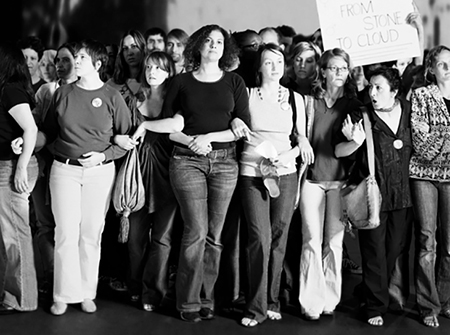
Continuing through April 7, 2024
The exhibition “On the Passage of a Few People through a Rather Brief Period of Time” showcases video and conceptual art with socially and politically oriented themes. One theme asserts that the polarized politics of our era mirror the problematic politics of 1968, 1989, 2001, 2011, 2016 and 2020. Another explores attitudes about our world that are unconsciously passed from one generation to another. A third highlights that intergenerational art and activism is alive and well, despite apparent differences among generations.
The title, “On the Passage of a Few People…,” is appropriated from the French Marxist theorist, philosopher, filmmaker Guy Debord’s 1959 semi-autobiographical situationist film.
UCLA art professor emeritus Mary Kelly (whose book, “Concentric Pedagogy, Selected Writings” © 2024, Bloomsbury Press, is an inspiration for this exhibition; it will be released on February 22nd) explains, “What is passed on, from one generation to another, seems to be both a practical question … and a riddle to be deciphered … an era could be defined as the discursive footprint of shared aspirations left by a few people passing through an infinitely brief period of geological time.” Kelly, born in 1941, an artist, writer and educator, founded a branch of first-generation conceptualism that is characterized by feminism and psychoanalysis.
While the exhibition contains project-based works by artists who have worked with Kelly, its centerpiece is her “WLM Demo Remix” (2008). This 90-second black and white film, containing a 2007 photo of activist feminists morphing into a 1970 Women’s Liberation demonstration photo, signifies the show’s intergenerational nature. “WLM” becomes a call to observe political repression — specifically right now as compared with that of previous times — including the banning of abortion.
Kelly and curator Juli Carson (UCI’s Director of Critical and Curatorial Studies, and of its University Art Galleries) explain that Kelly’s explorations into feminism, including the importance of dispassionately listening to artists and others, help inform this exhibition.
Karl Haendel’s pencil on paper, “Questions for My Father 10” (2023), as an example, contains 45 questions that the 40-something Jewish artist might have asked his father, had his family engaged in dialogue. Questions touch on personal topics that spark our own reflections: “How many women have you slept with? Did you ever go to a hooker? Did you ever cheat on mom? How did you feel knowing everybody who lived near us had more money? Did I disappoint you by not marrying a Jew? How did you get out of going to Vietnam? Why were you so angry all the time? What are your regrets?”
Haendel’s companion drawing, “Rodeo 13” (2023), of a beautiful young girl astride a horse, is inspired by a Remington sculpture of Teddy Roosevelt as a cowboy. With the girl as the protagonist, it is intended to “de-macho” a longstanding American myth. And as a romantic illustration of the wild west, the piece suggests that Haendel’s living with a difficult father motivated him to excel as an artist, given that life’s problems often inspire creativity. This concept is conveyed in other pieces in this show, with many serving to provoke debates on art in its most expansive and insightful manifestations.
The video, “Gaza Before the Law” (2018), presented by Latipa (born, Michelle Dizon) features the subliminal, hidden figure of the angry father, possibly referring to Israeli Prime Minister Benjamin Netanyahu. She conceived of and edited the piece, with the video shot by Akram Abousharar, a Palestinian-American lawyer who is based in Orange County. He traveled to Gaza in 2018 to meet with his family and other Palestinians. In 2014, after that earlier Israeli siege of Gaza, he had filed a lawsuit against the U.S. government, claiming that the U.S. cannot give money to a government committing human rights violations. The film further addresses the inability of the U.S. legal system to provide justice to the Palestinians because the occupied territories are not sovereign nations. The film's striking, dramatic visuals mirror the current Middle East disaster, with bombed-out buildings in the Gaza Strip and distraught Palestinian civilians.
Another disturbing video, Damir Avdagic’s “Repriza/Uzvracanje” (2018), displays four elderly Yugoslavians portraying millennials as they read a script written by them. That script explores intergenerational conflicts, especially as those frictions relate to the war in the former Yugoslavia from 1991-2001. The participants, many with dour expressions, convey dismay and discuss their feelings of guilt, shame and the legacy of communism.
The exhibition also includes Abigail Raphael Collins’ video of a conversation between the artist and her father about growing up during wartime and Kerry Tribe’s contentious text exchange, displayed on the walls, between the artist and her challenged mother. Taking the time to explore this exhibition, to absorb its pictures and texts, and to listen to the dialogues, reveals the intentions of artists skilled in traditional forms of art who choose to present conceptual pieces that express their motivating concerns.
